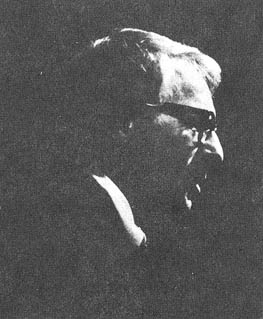Indelibly important science fiction author and giant of my childhood Ray Bradbury, who died last night, would probably never have described himself as writing about environmentalism — “A lot of lousy novels come from people who want to do good,” he said in an interview. But he did write about the relationship between humans and the worlds (Earth and otherwise) that sustain them, a relationship he often seemed to view as “tiny, stupid, heedless little insects scrabbling across the surface of something incomprehensibly old.” He had some unconventional ideas about fixing the future, too. Go read “The Toynbee Convector.” I will wait here for you.
To really get a feel for Bradbury’s vision of the world, the humans in it, and how they can live (or fail to live) together, you’ll have to read his 2035809180 books. But I found one relevant piece online, a very short 1951 story that prefigures America’s codependent love affair with cars. “The Pedestrian” isn’t Bradbury’s best work, but if you’ve ever been horrified by the degree to which affluent humans have holed up in their climate-controlled homes and SUVs, it just might send a shiver down your spine.
Here’s an excerpt:
Leonard Mead waited in the cold night.
“Just walking, Mr. Mead?”
“Yes.”
“But you haven’t explained for what
purpose.”
“I explained; for air, and to see, and just to
walk.”
“Have you done this often?”
“Every night for years.”
The police car sat in the center of the street
with its radio throat faintly humming.
“Well, Mr. Mead,” it said.
“Is that all?” he asked politely.
“Yes,” said the voice. “Here.” There was a
sigh, a pop. The back door of the police car sprang
wide. “Get in.”
Read the rest here. And then go read all the Bradbury you can get your hands on. (Even if you’re a fan already, there’s probably more you haven’t seen. The man was prolific.)



